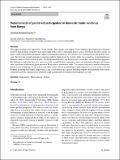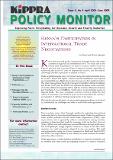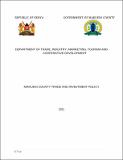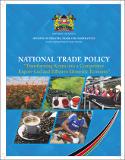| dc.description.abstract | This paper examines how regulatory, owner-specific, firm-specific and support factors influence participation in domestic
trade by Kenyan firms owned by men and women with a view to informing policy action. Data from the 2016 survey on
micro, small, and medium enterprises supported empirical estimations. Two models were estimated using the probit regression.
The first was on participation in domestic trade by firms owned by women, while the second was on participation in
domestic trade by firms owned by men. I controlled endogeneity and heterogeneity using the control function approach.
The findings revealed that firm size, access to credit, goodwill, firm registration status, and university education attainment
were significant in influencing participation of Kenyan firms in domestic trade. The evidence indicates a need to mainstream
gender issues in making of trade policy; and enforcement of laws guaranteeing women improved access to trade credit and
property including land rights. Improving access to incubation and capacity building support among female-owned firms
could drive growth, specialization, and knowledge accumulation for enhanced participation in trade | en |




